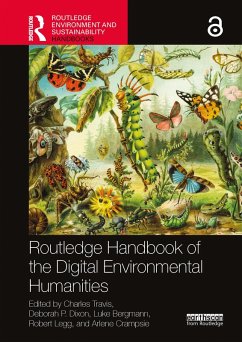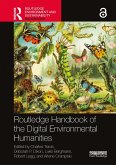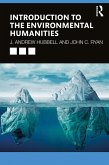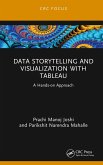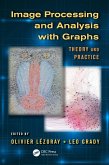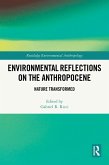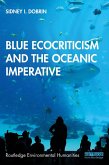Routledge Handbook of the Digital Environmental Humanities (eBook, PDF)
Redaktion: Travis, Charles; Crampsie, Arlene; Legg, Robert; Bergmann, Luke; Dixon, Deborah P.
46,95 €
46,95 €
inkl. MwSt.
Sofort per Download lieferbar

23 °P sammeln
46,95 €
Als Download kaufen

46,95 €
inkl. MwSt.
Sofort per Download lieferbar

23 °P sammeln
Jetzt verschenken
Alle Infos zum eBook verschenken
46,95 €
inkl. MwSt.
Sofort per Download lieferbar
Alle Infos zum eBook verschenken

23 °P sammeln
Routledge Handbook of the Digital Environmental Humanities (eBook, PDF)
Redaktion: Travis, Charles; Crampsie, Arlene; Legg, Robert; Bergmann, Luke; Dixon, Deborah P.
- Format: PDF
- Merkliste
- Auf die Merkliste
- Bewerten Bewerten
- Teilen
- Produkt teilen
- Produkterinnerung
- Produkterinnerung

Bitte loggen Sie sich zunächst in Ihr Kundenkonto ein oder registrieren Sie sich bei
bücher.de, um das eBook-Abo tolino select nutzen zu können.
Hier können Sie sich einloggen
Hier können Sie sich einloggen
Sie sind bereits eingeloggt. Klicken Sie auf 2. tolino select Abo, um fortzufahren.

Bitte loggen Sie sich zunächst in Ihr Kundenkonto ein oder registrieren Sie sich bei bücher.de, um das eBook-Abo tolino select nutzen zu können.
This handbook explores the digital methods and tools scholars use to observe, interpret and manage nature in several different academic fields. Essential reading for those interested in the use of digital tools in study of the environment from a wide range of disciplines, and for those working in the environmental humanities.
- Geräte: PC
- ohne Kopierschutz
- eBook Hilfe
- Größe: 18.54MB
Andere Kunden interessierten sich auch für
![Routledge Handbook of the Digital Environmental Humanities (eBook, ePUB) Routledge Handbook of the Digital Environmental Humanities (eBook, ePUB)]() Routledge Handbook of the Digital Environmental Humanities (eBook, ePUB)46,95 €
Routledge Handbook of the Digital Environmental Humanities (eBook, ePUB)46,95 €![Introduction to the Environmental Humanities (eBook, PDF) Introduction to the Environmental Humanities (eBook, PDF)]() J. Andrew HubbellIntroduction to the Environmental Humanities (eBook, PDF)37,95 €
J. Andrew HubbellIntroduction to the Environmental Humanities (eBook, PDF)37,95 €![Data Storytelling and Visualization with Tableau (eBook, PDF) Data Storytelling and Visualization with Tableau (eBook, PDF)]() Prachi Manoj JoshiData Storytelling and Visualization with Tableau (eBook, PDF)21,95 €
Prachi Manoj JoshiData Storytelling and Visualization with Tableau (eBook, PDF)21,95 €![Optical, Acoustic, Magnetic, and Mechanical Sensor Technologies (eBook, PDF) Optical, Acoustic, Magnetic, and Mechanical Sensor Technologies (eBook, PDF)]() Optical, Acoustic, Magnetic, and Mechanical Sensor Technologies (eBook, PDF)81,95 €
Optical, Acoustic, Magnetic, and Mechanical Sensor Technologies (eBook, PDF)81,95 €![Image Processing and Analysis with Graphs (eBook, PDF) Image Processing and Analysis with Graphs (eBook, PDF)]() Image Processing and Analysis with Graphs (eBook, PDF)84,95 €
Image Processing and Analysis with Graphs (eBook, PDF)84,95 €![Environmental Reflections on the Anthropocene (eBook, PDF) Environmental Reflections on the Anthropocene (eBook, PDF)]() Environmental Reflections on the Anthropocene (eBook, PDF)42,95 €
Environmental Reflections on the Anthropocene (eBook, PDF)42,95 €![Blue Ecocriticism and the Oceanic Imperative (eBook, PDF) Blue Ecocriticism and the Oceanic Imperative (eBook, PDF)]() Sidney I. DobrinBlue Ecocriticism and the Oceanic Imperative (eBook, PDF)40,95 €
Sidney I. DobrinBlue Ecocriticism and the Oceanic Imperative (eBook, PDF)40,95 €-
-
-
This handbook explores the digital methods and tools scholars use to observe, interpret and manage nature in several different academic fields. Essential reading for those interested in the use of digital tools in study of the environment from a wide range of disciplines, and for those working in the environmental humanities.
Dieser Download kann aus rechtlichen Gründen nur mit Rechnungsadresse in A, B, BG, CY, CZ, D, DK, EW, E, FIN, F, GR, HR, H, IRL, I, LT, L, LR, M, NL, PL, P, R, S, SLO, SK ausgeliefert werden.
Produktdetails
- Produktdetails
- Verlag: Taylor & Francis eBooks
- Seitenzahl: 556
- Erscheinungstermin: 12. September 2022
- Englisch
- ISBN-13: 9781000635805
- Artikelnr.: 64551807
- Verlag: Taylor & Francis eBooks
- Seitenzahl: 556
- Erscheinungstermin: 12. September 2022
- Englisch
- ISBN-13: 9781000635805
- Artikelnr.: 64551807
- Herstellerkennzeichnung Die Herstellerinformationen sind derzeit nicht verfügbar.
Charles Travis is Associate Professor of Geography and GIS in the Department of History at the University of Texas, Arlington, USA, and Associate Research Fellow at the Trinity Centre for the Environmental Humanities, Trinity College Dublin, Ireland. Deborah P. Dixon is Professor of Geography at the School of Geography and Earth Sciences at the University of Glasgow, Scotland. Luke Bergmann is Associate Professor of Geography and Canada Research Chair in GIS, Geospatial Big Data and Digital Geohumanities with the Department of Geography at the University of British Columbia, Vancouver, Canada. Robert Legg is Professor of Geography with the Department of Earth, Environmental, and Geographical Sciences at Northern Michigan University, Marquette, Michigan, USA. Arlene Crampsie is Assistant Professor of Historical Geography at the School of Geography at University College Dublin, Ireland.
Introduction: Routledge Handbook of the Digital Environmental Humanities; PART I Overviews 1 Cowboys, Cod, Climate, and Conflict: Navigations in the Digital Environmental Humanities; 2 The Armchair Traveller's Guide to Digital Environmental Humanities; 3 Deep Weather; 4 Adding Spatial Context to the 17 April 1975 Evacuation of Phnom Penh: How Spatial Video Geonarratives Can Geographically Enrich Genocide Testimony; 5 Normalised Alterity: Visualising Black Spatial Humanities; 6 New Machines in the Garden: The Digital Environmental Humanities; PART II Voicing Indigeneity 7 From Localised Resistance to the Social Distance Powwow: Movements in the World of Indigenous Americans; 8 Countermapping Plants and Indigenous Lifeways in North America: A Case Study of Tending to Turtle Island; 9 The Double Data Movement towards the Ecological Pluriverse: The Case of the Native Land Information System; 10 Groundworks: Re-storying Northern California with Emplaced Indigenous Media; 11 Datafication, Digitisation, and the Narration of Agriculture in Malawi: From Productivity Measures to Curated Folklore; 12 Spatial Video Geonarratives: Digitising Indigenous Folklores in Urban Flooding Lived Experiences; PART III Geopoetics and Performance 13 Exploring Sensible Virtual Immersive Spaces through Digital Georamas; 14 The Digital Poetics of Lost Waterscapes in Coimbatore, South India; 15 Relationality in the Online Literary Journal Spiral Orb; 16 Chemo Creatures in a Digital Ocean!: The Making of a Speculative Ecosystem; 17 Innovative and Creative Geographies: The Shifting Boundaries of Inside, Outside, Real, and Imagined Spaces; 18 The Sound of Environmental Crisis: Silence as/and (Eco)Horror in A Quiet Place; PART IV Species, Systems, Sustainability 19 Genotype, Phenotype, Phototype: Digital Photography, Biological Variety, and Excessive Overpopulation of Types; 20 (Inter)National Connections: Linking Nordic Animals to Biodiversity Observation Networks; 21 A Shark in Your Pocket, a Bird in Your Hand(Held): The Spectacular and Charismatic Visualisation of Nature in Conservation Apps; 22 Images of Nature through Platforms: Practices and Relationships as a Research Field and an Epistemic Vantage Point of DEH; 23 A Novel Method Suggestion for the Achievement of Environmental Citizenship Behaviour in the Digitising World; PART V Digital Chronicles of Environment, Literature, Cartography, and Time 24 Online Transcription of Regional Icelandic Manuscripts Initiative; 25 "Thick Mapping" for Environmental Justice: EJScreen, ArcGIS, and Contemporary Literature; 26 One Map Closer to the End of the World (As We Know It): Thinking Digital Cartographic Humanities with the Anthropocene; 27 The Deafening Roar of the Digital Environmental Humanities: Case Studies in New Scholarship; 28 The COVID-19 Testimonies Map: Representing Italian "Pandemic Space" Perceptions with Neogeography Technologies; PART VI Algorithmic Landscaping 29 Digital Oil and the Planetary Oilfield; 30 Between Digital and Territorial Turns: A Forking Path; 31 Landscapes in Motion: Cartographies of Connectivity and the Place of Physical Geography in the Environmental and Spatial Humanities; 32 (Re)Imagining the Ibis: Multispecies Future(s), Smart Urban Governance, and the Digital Environmental Humanities; 33 Elemental Computation: From Non-human Media to More-than-Digital Information Systems
Introduction: Routledge Handbook of the Digital Environmental Humanities; PART I Overviews 1 Cowboys, Cod, Climate, and Conflict: Navigations in the Digital Environmental Humanities; 2 The Armchair Traveller's Guide to Digital Environmental Humanities; 3 Deep Weather; 4 Adding Spatial Context to the 17 April 1975 Evacuation of Phnom Penh: How Spatial Video Geonarratives Can Geographically Enrich Genocide Testimony; 5 Normalised Alterity: Visualising Black Spatial Humanities; 6 New Machines in the Garden: The Digital Environmental Humanities; PART II Voicing Indigeneity 7 From Localised Resistance to the Social Distance Powwow: Movements in the World of Indigenous Americans; 8 Countermapping Plants and Indigenous Lifeways in North America: A Case Study of Tending to Turtle Island; 9 The Double Data Movement towards the Ecological Pluriverse: The Case of the Native Land Information System; 10 Groundworks: Re-storying Northern California with Emplaced Indigenous Media; 11 Datafication, Digitisation, and the Narration of Agriculture in Malawi: From Productivity Measures to Curated Folklore; 12 Spatial Video Geonarratives: Digitising Indigenous Folklores in Urban Flooding Lived Experiences; PART III Geopoetics and Performance 13 Exploring Sensible Virtual Immersive Spaces through Digital Georamas; 14 The Digital Poetics of Lost Waterscapes in Coimbatore, South India; 15 Relationality in the Online Literary Journal Spiral Orb; 16 Chemo Creatures in a Digital Ocean!: The Making of a Speculative Ecosystem; 17 Innovative and Creative Geographies: The Shifting Boundaries of Inside, Outside, Real, and Imagined Spaces; 18 The Sound of Environmental Crisis: Silence as/and (Eco)Horror in A Quiet Place; PART IV Species, Systems, Sustainability 19 Genotype, Phenotype, Phototype: Digital Photography, Biological Variety, and Excessive Overpopulation of Types; 20 (Inter)National Connections: Linking Nordic Animals to Biodiversity Observation Networks; 21 A Shark in Your Pocket, a Bird in Your Hand(Held): The Spectacular and Charismatic Visualisation of Nature in Conservation Apps; 22 Images of Nature through Platforms: Practices and Relationships as a Research Field and an Epistemic Vantage Point of DEH; 23 A Novel Method Suggestion for the Achievement of Environmental Citizenship Behaviour in the Digitising World; PART V Digital Chronicles of Environment, Literature, Cartography, and Time 24 Online Transcription of Regional Icelandic Manuscripts Initiative; 25 "Thick Mapping" for Environmental Justice: EJScreen, ArcGIS, and Contemporary Literature; 26 One Map Closer to the End of the World (As We Know It): Thinking Digital Cartographic Humanities with the Anthropocene; 27 The Deafening Roar of the Digital Environmental Humanities: Case Studies in New Scholarship; 28 The COVID-19 Testimonies Map: Representing Italian "Pandemic Space" Perceptions with Neogeography Technologies; PART VI Algorithmic Landscaping 29 Digital Oil and the Planetary Oilfield; 30 Between Digital and Territorial Turns: A Forking Path; 31 Landscapes in Motion: Cartographies of Connectivity and the Place of Physical Geography in the Environmental and Spatial Humanities; 32 (Re)Imagining the Ibis: Multispecies Future(s), Smart Urban Governance, and the Digital Environmental Humanities; 33 Elemental Computation: From Non-human Media to More-than-Digital Information Systems
